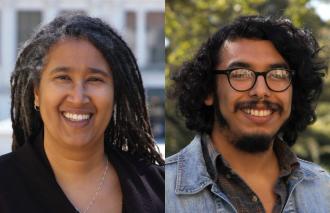In 2018, 150 years after the establishment of the original University of California, and more than 50 years after the Free Speech Movement, students continue to advocate for their beliefs. The use of poetry — relating through words the otherwise incommunicable — as a political tool proves fitting at an institution most widely recognized for a commitment to academic excellence and revolutionary ideals.
As evidenced by a series of publications, organizations and clubs on campus, many UC Berkeley students continue to let their voices be heard, with poetry acting as a medium for pushing back against Mario Savio’s metaphorical machine.
Founded in 1974 by Rob Sean Wilson, the Berkeley Poetry Review works to provide a platform for an array of ideals, focusing largely on those that subvert the status quo. As editor in chief of the publication, Berkeley student and former Daily Cal writer Lindsay Choi reads every submission received by the journal. They lead the editorial board in considering which poems to publish.
“Publishing is never an apolitical venture,” Choi explained in an interview with The Daily Californian. “When we put these anthologies together and choose what to publish, there is a way that that action sort of tacitly endorses the view that this is something that people should read.”
Hence, Choi described the publication’s focus on poems that are subversive, but not violent. “We do have a commitment to publishing things that are radical,” the editor noted, at the same time pointing out, “We’re filtering through submissions for things that we think could be harmful.”
While such decisions have at times sparked controversy and prompted questions of publication ethics, Choi remained firm in their resolution to prevent the Berkeley Poetry Review from espousing harmful material: “I just, personally, strongly believe that choosing not to publish something because it’s violent is not censorship,” they asserted.
Though founded almost 30 years after the Berkeley Poetry Review, student-driven spoken word poetry group CalSLAM possesses a similar dedication to the role of poetry as self-expression, while also not shying away from calling out violent rhetoric. CalSLAM director Ricky Santuario detailed the mission of the club.
“We understand that a lot of our open mics are free speech zones, and people can speak whatever they want to speak. That doesn’t mean that they will be free of accountability.” Santuario said. “We want folks to feel safe in our space.”
In this fashion, CalSLAM aims to facilitate a space of comfort, where individuals can share their stories. Under the oversight of a board of about 12 people, CalSLAM works to foster a dynamic and supportive community for members. Santuario expressed the necessity of asserting the values and needs of CalSLAM members, regardless of partial funding by the university.
“It’s about making sure that … even though we are an RSO (Registered Student Organization), we still continue to be a space in which we continue to challenge and stay political,” Santuario said.
In addition to CalSLAM, Santuario also cited another campus organization that considers poetry a powerful communication tool: Poetry for the People. Founded by June Jordan in 1991,the program and four-unit class, P4P for short, aims to help students develop their unique poetic voices in a supportive and communal environment.
“It’s such a historical program,” P4P director, spoken word poet and UC Berkeley professor of African American studies Aya de Leon said. “It reflects a sort of breakthrough in the ‘90s around integrating the personal, the political and the artistic that was led by women of color.”
Today, de Leon, a woman of color herself, works to further combine the personal, political and artistic in order to provide students with a safe space in which to express themselves. The professor feels that such an environment has the potential to profoundly benefit students, adding that poetry can allow youths an opportunity to communicate their experiences. Having perceived an increase in the number of her pupils suffering from mental illnesses such as anxiety and depression, de Leon views poetic expression as especially poignant today.
While the professor acknowledged the campus’s background of activism and freedom of expression — which, in theory, aligns with her vision for the benefits of poetry, — she also related that at times students have felt unheard, or even unsafe, at UC Berkeley.
“P4P is powerful in that it continues the commitment (to upholding that legacy),” de Leon said, referencing UC Berkeley’s progressive history.
Whether spoken or silent, at an open mic or in the classroom, poetry continues to provide an infinitely multifaceted and malleable form of expression for many UC Berkeley students. Indeed, poetry may work to ameliorate a discontinuity between the campus’s proclaimed mission of providing a democratic education to a diverse student population— at the very least, it allows students to voice the existence of such a gap.
Contact Ryan Tuozzolo at rtuozzolo@dailycal.org.
